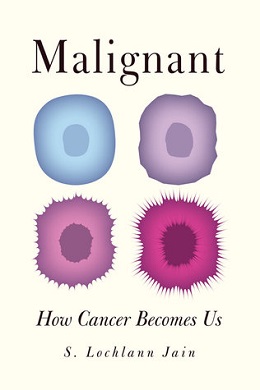Malignant: How Cancer Becomes Us
Malignant: How Cancer Becomes Us is a comprehensive exploration of the cancer epidemic in the United States, delving into the complex relationship between cancer and American society. The book, authored by S. Lochlann Jain, an esteemed professor of anthropology at Stanford University, was published in 2013. It offers a critical examination of how cancer impacts individuals and the nation as a whole, intertwining personal narratives, historical analysis, and a critique of the cancer industry.
Overview[edit | edit source]
Malignant: How Cancer Becomes Us argues that cancer is not just a biological disease but a societal condition, reflecting and shaping American cultural and economic landscapes. Jain explores how cancer is diagnosed, treated, and understood in the U.S., highlighting the intricate connections between the disease and aspects of American life, including capitalism, consumerism, and the healthcare system. The book examines the paradoxes within cancer care, research funding, and the pharmaceutical industry, revealing how these elements contribute to the complexity of the cancer experience.
Themes[edit | edit source]
The book covers several key themes:
- The Commercialization of Cancer: Jain discusses how cancer has become a profitable industry, with pharmaceutical companies, healthcare providers, and non-profit organizations all playing roles in the commercialization of the disease.
- The Politics of Cancer Research: The allocation of funding for cancer research is scrutinized, with Jain arguing that it often reflects political and economic interests rather than scientific need or potential for breakthroughs.
- Cancer and Identity: The author explores how a cancer diagnosis affects individuals' identities and their relationships with others, including the stigmatization of certain cancers and the "warrior" narrative often encouraged in cancer discourse.
- Environmental and Lifestyle Factors: Jain addresses how lifestyle choices and environmental exposures contribute to cancer risk, critiquing simplistic narratives that blame individuals for their illness.
Critical Reception[edit | edit source]
Malignant: How Cancer Becomes Us has been praised for its insightful analysis and Jain's ability to weave together diverse elements into a coherent critique of the cancer epidemic. Critics have noted the book's contribution to discussions about healthcare, the pharmaceutical industry, and the societal impact of disease. However, some have pointed out that the book's broad scope sometimes leads to a dense and complex narrative.
Impact[edit | edit source]
The book has sparked discussions in academic and medical circles about the need to reconsider the approach to cancer treatment and research in the U.S. It has been used in courses related to medical anthropology, healthcare policy, and sociology, encouraging students to think critically about the intersection of disease, society, and culture.
See Also[edit | edit source]
Search WikiMD
Ad.Tired of being Overweight? Try W8MD's physician weight loss program.
Semaglutide (Ozempic / Wegovy and Tirzepatide (Mounjaro / Zepbound) available.
Advertise on WikiMD
|
WikiMD's Wellness Encyclopedia |
| Let Food Be Thy Medicine Medicine Thy Food - Hippocrates |
Translate this page: - East Asian
中文,
日本,
한국어,
South Asian
हिन्दी,
தமிழ்,
తెలుగు,
Urdu,
ಕನ್ನಡ,
Southeast Asian
Indonesian,
Vietnamese,
Thai,
မြန်မာဘာသာ,
বাংলা
European
español,
Deutsch,
français,
Greek,
português do Brasil,
polski,
română,
русский,
Nederlands,
norsk,
svenska,
suomi,
Italian
Middle Eastern & African
عربى,
Turkish,
Persian,
Hebrew,
Afrikaans,
isiZulu,
Kiswahili,
Other
Bulgarian,
Hungarian,
Czech,
Swedish,
മലയാളം,
मराठी,
ਪੰਜਾਬੀ,
ગુજરાતી,
Portuguese,
Ukrainian
Medical Disclaimer: WikiMD is not a substitute for professional medical advice. The information on WikiMD is provided as an information resource only, may be incorrect, outdated or misleading, and is not to be used or relied on for any diagnostic or treatment purposes. Please consult your health care provider before making any healthcare decisions or for guidance about a specific medical condition. WikiMD expressly disclaims responsibility, and shall have no liability, for any damages, loss, injury, or liability whatsoever suffered as a result of your reliance on the information contained in this site. By visiting this site you agree to the foregoing terms and conditions, which may from time to time be changed or supplemented by WikiMD. If you do not agree to the foregoing terms and conditions, you should not enter or use this site. See full disclaimer.
Credits:Most images are courtesy of Wikimedia commons, and templates Wikipedia, licensed under CC BY SA or similar.
Contributors: Prab R. Tumpati, MD

